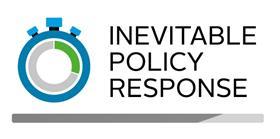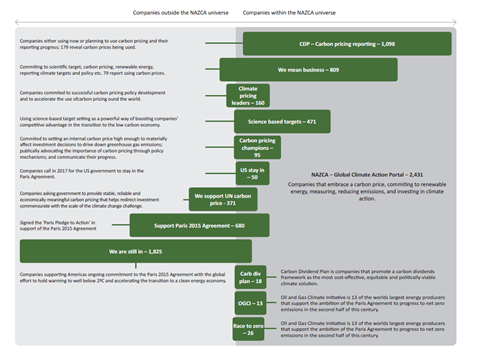
This study is part of the Inevitable Policy Response (IPR), a pioneering project which aims to prepare financial markets for climate-related policy risks. What is “Inevitable” is some further policy response as the realities of climate change become increasingly apparent. The key questions are when this response will come, what policies will be used, and where the impact will be felt. IPR forecasts a response by 2025 that will be forceful, abrupt, and disorderly because of the delay. It quantifies the impact of this response on the real economy and financial market.
Mark Fulton and Daris Delins, Energy Transition Advisors
Business and investor public support for climate transition policy (pdf)
Business and investor support for action play an important part of “why” this policy response is likely to emerge over the next 6 years. These give an economic and market mandate to policy makers for action. This support remains significant for policy makers seeking a broad mandate for action even though some companies have also participated in activities or groups not aligned with a rapid climate transition. The official position of business have typically been signed off at executive level, and are motivated by the substantial stake the companies have in the climate transition and the nature of the policy response. For many businesses the positions represent a long-term strategic outlook that recognises the impact that a disruptive policy transition to address climate change would have on future growth and performance. In addition, they represents commitments in which companies stake their reputation and to which they hold themselves publicly to their key stakeholders.
This study involves a unique meta-analysis of 2,490 corporates who have expressed public support for the climate transition. It draws on a range of online portals that record various aspects of this support, and includes many of the world’s most significant companies and institutional investors.
It finds that:
- $39 trillion of public companies by market capitalisation representing 72% of the MSCI World Index have publicly expressed support for the climate transition and/or are taking related action, while investors with at least $34trn of Assets under Management similarly support such action.

Key findings
In terms of corporate support by market capitalisation, we identify:
1. $15tn support of the Paris Agreement, with the ambition to limit global warming to ‘well below 2°C’.
2. $7tn have called for carbon prices in some format.
3. $18tn have supported both the Paris Agreement and/or the introduction of Carbon Prices.
4. $35tn are using or plan to use Carbon Prices, have set science-based targets or other emissions targets.
Removing double counting, this means in total $39tn by market capitalization representing 72% of the MSCI World Index have supported Paris and/or call for a carbon price and/or use, plan to use carbon prices and/or set emissions targets.
5. In regional terms, it is notable that 50% of the corporate support is from the US.
6. At a MSCI sector level, it is notable around 75% of the Energy sector and Materials and Utilities show support of some kind.
7. While the focus of this study is on public companies, we note that some key unlisted government entities such as Saudi Aramco, Pemex (Mexico), China National Petroleum Company (CNPC), and State Grid Corporation of China (SGCC) have shown support for Paris.
8. Given an emphasis on land use in IPR, we note that the major food companies included in the study account for $1tn of market cap, or 30% of the MSCI Consumer Staples sector.
In terms of investor support by Assets Under Management (AUM), we also identify:
9. 77 asset owners/managers with $34tn of AUM have signed up under the “Investor Agenda” calling on global policy leaders to support and implement the Paris 2015 Agreement, including putting a meaningful price on carbon.
10. 360 investment managers and asset owners/investment managers with $34tn of AUM as members of “Climate Action 100+” are committed to engaging with companies’ management and boards to ensure their reporting and business strategies are consistent with the goals of the Paris 2015 Agreement
11. 142 asset owners/investment managers have signed up to the “We Are still In initiative”, re-iterating the need for continued U.S. support for the Paris 2015 Agreement.
Removing duplicates across these three initiatives, in summary we find 673 asset owners/ investment managers, accounting for at least $34tn in AUM who have expressed their support in driving the climate transition and calls to action by governments and companies.
Viewed in the round, this represents a striking signal of support for policies and actions which support the climate transition from businesses and investors, demonstrating a strong desire for certainty on the climate transition.
Yet, despite this rising chorus, when it comes to tangible political progress it can often seem like a case of two steps forward, one step back. Indeed, there are few signals that governments will act forcefully on climate change in the next 2 years. But this situation is not sustainable. The realities of climate change will inevitably catch up with governments across the globe – and they are beginning to.
Alongside business demands outlined in this paper, the pressure for policy action will increase and come from all angles – environmental, social, and economic - fuelled by fears over national security; enabled by advances in technology and upward pressure by electorates and citizens to act.
That’s why, alongside calling for policy action now, to protect and enhance value investors and companies must prepare for what is the most likely outcome – a policy response by 2025 that will be forceful, abrupt, and disorderly because of the delay.
The Meta-analysis – focus on companies
To complete this meta-analysis of companies we pooled public sources, drawing from a variety of online portals that track company support and commitments to the climate transition and related issues. Double counting is eliminated. Some companies may be supporting in one or more categories. The focus of our study is publicly listed companies.
There are many ways a corporation could support the climate transition. For the purposes of this paper we have extracted from the on line portals the following aspects:
- Support for the Paris 2015 Agreement – which implies increased policy ambition in line with the ratchet mechanism in that the Agreement
- Calling for a Carbon Price – this could be in various structures, but in the whole is focussed on ensuring a price is established
- Using/Planning to use Carbon Prices or setting Emissions targets
This process may in fact understate the sum-total of corporate calls to action as we have been unable to conduct an analysis at the level of individual company statements.
Downloads
Business and investor public support for climate transition policy
PDF, Size 1.78 mb











